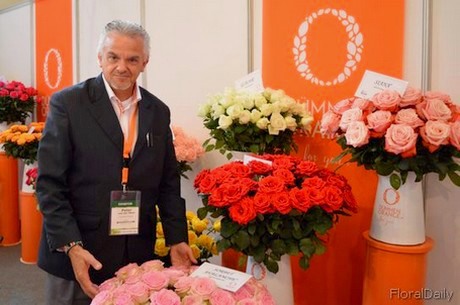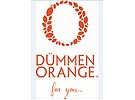"As a mid-size breeder, like Terra Nigra was, it’s gonna be very difficult to survive on your own in our business. Therefore, I think the owners of Terra Nigra have made a good decision by selling their shares to Dümmen Orange. The now available financial backing of Dümmen Orange, will give us the opportunity to concentrate on, and invest again in long term breeding strategies, instead of just surviving the day. The first mentioned had come down to an unacceptably low level, due to Terra Nigra's tight financial position.”

Peter van der Meer at the IFTEX in Nairobi, Kenya.
Causes low royalty prices
In the first place, the lower royalty prices are caused by the increased number of breeders active in the rose business, so more competition. "The still increasing number of rose breeders is in contradiction with the level of the net result the existing breeders are making. This is because it isn’t easy even in a main market such as East Africa (EA). And we have to realize that the EA market is the only growing market for our products in the world. Europe (read The Netherlands) has been in decline for over ten years, and South America (Ecuador and Colombia) are at best stable. For how much longer the expansion in East Africa will go on, will depend on the world market for cut roses as a whole, which isn’t growing," explains van der Meer. According to him, more expansion in EA will only be possible if somewhere else hectares will be uprooted. "The EA market is growing for over 20 years now, and of course we all hope the sky will be the limit, but more expansion is hardly to be expected unless rose production in South America will decrease."
Secondly, most breeders still have expensive head offices and facilities in Europe, where the production market for roses has melted to a doubtful low level. "Too often these offices are financed by income from the equatorial markets (East Africa and South America), which has become a too heavy load."
Besides that, also growers have to deal with financial difficulties, which are affecting the breeders indirectly. "The recent exchange rate situation (USD vs Euro), the tightened supermarket requirements, regarding the use of f.i. chemical, increasing labour costs, the ruble crisis in Russia and the low and unstable prices at the auctions for example, are all affecting the breeders indirectly," explains van der Meer.
"Do not rely on one variety"
According to van der Meer it is very important to have a broad assortment and a couple of popular varieties selling over 10 hectares per year. "We can’t rely on one variety," he says. "If this variety collapses, we don’t have a backup that is strong enough." He experienced this when he worked for Terra Nigra. "We had a top selling variety, called Grand Prix, which kept us going for 12 years. However, major sales of GP came to an end in 2007-2008. At that time, our assortment wasn’t broad enough to compensate the gape in our income. This together with the upcoming global crisis, the bankruptcy of ABN AMRO and ING (both banks we were dealing with) it was understandable that we ended up in a difficult situation. When you have enough flesh on the bones you will survive, but unfortunately this is not the case anymore for too many breeders." According to van der Meer, it’s not rocket science to know that it’s better to have a 60 hectare sales with 4-5 varieties, than from 1 or 2. And for the bigger breeders, who are able to offer this wide range package, it’s much easier to make multi-hectare deals with farms. For smaller breeders, this is often not financially achievable. Therefore, van der Meer is pleased with the current formation of Dümmen Orange, in which three formally independent rosebreeders (Bartels, Lex+ and Terra Nigra) are united, because "it’s no secret in which market position we’re targeting to see ourselves in the near future."
Advantages of Dümmen Orange
"Also in Europe, the Dümmen Orange rose assortment, is leaning heavily on the 'Avalanche', already a legendary variety in this market for years. This variety has also been available for 17-18 years and there will be a day, although we all expect it will be in the far future, that this variety will no longer be in demand. Also there we’re working on widening our assortment to be less vulnerable if a major variety collapses." An additional advantage of this broad assortment is the fact that the company can also supply a broader market. "Roughly, you can say that Terra Nigra is stronger in supermarket varieties and Lex+ better in the 'high end’ assortment, but that difference will soon under Dümmen Orange not be visible anymore," says van der Meer. Besides that, this new situation enables the breeder to invest in improving their assortment, like resistances and new breeding technology for example. "We come from a position that we had to develop varieties that had to make money immediately, because there was hardly financial space to invest in long term breeding projects, and I don’t expect it is much different for other breeders.
First time as Dümmen Orange at the IFTEX
On April 23th 2015, Dümmen Orange was established. Peter van der Meer and his colleagues of former Terra Nigra and Lex+/Bartels exhibited for the first time at this show as Dümmen Orange. "In previous years, Lex+/Bartels and Terra Nigra exhibited separately, but now we were all there under the same name," says van der Meer. “A new, interesting and very challenging experience after 37 years of Terra Nigra”.
But how are the new and existing customers reacting to this new formation? "The opinions are divided, some growers like to work with a large company with a wide assortment and others prefer smaller companies. Some growers will maybe be afraid that if more breeders will cluster the royalty prices will go up in the long run, but that is not the reason behind the merge. Financial space for more innovation and better assortment is the real motivation behind it all.
People will get used to it, as we are doing at the moment as well. We are still the same faces and we still offer the same varieties and service. I think within a year the growers will be familiarized with the name Dümmen Orange. Let's treasure the past, but most of all look forward into a bright future”.
For more information

Dümmen Orange
Peter van der Meer
Email: petervandermeer@dummenorange.com
www.dummenorange.com
